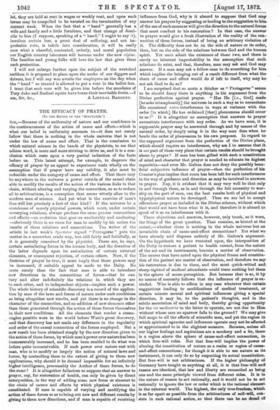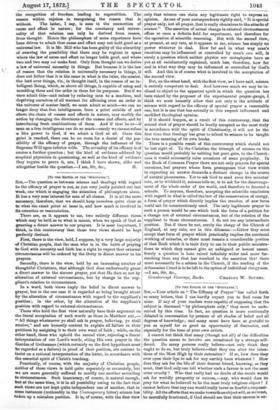THE EFFICACY OF PRA.YER.
rTo THE EDITOR Olt THE "SPECTATOR."]
Sus,—Because of the uniformity of nature and our confidence in the continuousness of the action of cause and effect—which is what our belief in uniformity amounts to—it does not surely follow that there is nothing in the whole universe that is not under the law of cause and effect. That is the conclusion to which natural science in the hands of the physicists, to use that odious word, is more and more striving to drive us, and it is a con- clusion which rests upon a very partial induction of the facts before us. This latest attempt, for example, to disprove the efficacy of prayer by an appeal to experience rests wholly on the assumption that if prayer have any validity, it also must be reducible under the category of cause and effect. That there may be anywhere in the universe a power outside of the causal chain able to modify the results of the action of the various links in that chain, without altering and varying the connection, so as to reduce all to arbitrariness, is a conception that seems utterly alien to the modern man of science. And yet what is the exercise of man's free-will but precisely a fact of that kind ? If the universe be a storehouse of merely physical powers, which must, under certain unvarying relations, always produce the same precise connections and effects—an evolution that goes on unalterably and unaltering —obviously there is no room for man to modify by his action the results of these relations and connections. The writer of the article in last week's Spectator signed " Protagoras " puts the matter in a somewhat crude way, but still fairly and faithfully, as it is generally conceived by the physicist. There are, he says, certain assimilating forces in the human body, and the duration of the latter depends upon its assimilation of certain external elements, or consequent rejection, of certain others. Now, if the doctrine of prayer be true, it must imply that these powers may be increased, if suitable appeal be made to the Deity. No more surely than the fact that man is able to introduce new directions in the connections of forces—that he can vary and alter indefinitely the relations in which they are to each other, and to independent objects—implies such a power. The whole history of scientific discovery is a record of the applica- tion by man of the laws and forces of nature under such conditions as bring altogether new results, and yet there is no change in the character of the connection, and no addition of new elements other than those generated through the action of these forces themselves in their new conditions. All the elements that render a steam- engine possible were in the world before Watt's great discovery, and that discovery has not made any difference in the regularity and order of the causal connection of the forces employed. But a new result has been obtained simply by the new direction given to the action of these forces, by which man's power over nature has been immeasurably increased, and he has been enabled to do what was before quite inconceivable. If such power over nature rest with man, who is to modify so largely the action of natural laws and forces, by controlling them to the extent of giving to them new applications, why should it be deemed impossible for an infinitely higher intelligence, presumably the Author of these forces, to do the same? It is altogether fallacious to suppose that an answer to prayer, say, for restoration of health, can only be given by direct interposition, in the way of adding some new force or element to the chain of causes and effects by which physical existence is constituted. If man is capable of varying and modifying the action of these forces so as to bring out new and different results by giving to them new directions, and if man is capable of receiving
influence from God, why is it absurd to suppose that God may answer his prayers by suggesting or leading to the suggestion to bins
of the use of such means as will give the direction to the natural forces that must conduct to his restoration ? In that ease, the answer- to prayer would give a fresh illustration of the reality of the con- nection of these forces, instead of being an arbitrary violation of it. The difficulty does not lie on the side of nature or its order, then, but on the side of the relations between God and the human. spirit. Yet once admit the existence of these two, and there is. surely no inherent improbability in the assumption that such- relations do exist, and that, therefore, man may ask and God may answer. If a man may ask a fellow-man to do something for hiu. which implies the bringing out of a result different from what the chain of cause and effect would do if left to itself, why may he' not ask God to do so?
I am surprised that so acute a thinker as " Protagoras " seems- to be should fancy there is anything in his argument from the- Divine perfection against prayer. "Has He [i.e., God] made [he asks triumphantly] the universe in such a way as to necessitate His occasional extra-interference in ways at variance with the order [in which] He has ordained [that] phenomena should occur. to us ?" It is altogether an assumption that answers to prayer- necessitate interference with any order: As we have seen, it is supposable prayer may be answered through and by means of the- natural order, by simply using it in the way man does when he' bends the order of phenomena to his own purposes. In regard to. the supposed argument from the perfection of the Divine plans,. which should require no interference, why am .1 to assume that it is not part of these very plans that certain results should be brought. about by prayer? If man has been gifted with such a constitution of mind and character that prayer is needed to educate its highest. capacities—and even Mr. Galton does not deny the possibly bene- ficial subjective influence of prayer—then the perfection of his Creator's plan implies that room has been left for such interferences- in the way of guidance and direction as may be involved in answers to prayer. Nay, it is evident that it may very well be that only in and through these, as in and through the felt necessity to wor- ship on the part of man, can the best results both of physical and) hyperphysical nature be developed. Thus we are led to accept efficacious prayer as included in the Divine scheme, without which that would not have been what it is, and therefore it is absurd to- speak of it as an interference with it.
These objections and answers, however, only touch, as it were,_ the fringe of the great question. That remains, as hinted at the outset,—whether there is nothing in the whole universe but an invariable chain of cause-and-effect connections? Yet what we. have already said disposes entirely of Mr. Galion's, argument. On the hypothesis we have ventured upon, the interposition of the Deity to restore a patient to health cannot, from the nature of the act and its instruments, become a matter of observation. The causes that have acted upon the physical frame and constitu- tion of the patient are matter of observation, and therefore we say his restoration is due to them, and the most quick-witted and sharp-sighted of medical attendants could trace nothing but them- in the sphere of sense-perception. But because that is so, it by no means of necessity follows that the influence of prayer is ex- eluded. Who is able to affirm in any case whatever that certain. suggestions leading to modifications of medical treatment, or- certain minute mental and spiritual influences giving a special direction, it may be, to the patient's thoughts, and in the subtle association of mind and body, thereby giving opportunity for the vie medieatrix in the latter to operate, are not due to Him. without whose care no sparrow falls to the ground ? We may give full scope to all the efforts of scientific men, and yet the region in -which spiritual agencies and influences operate may not be affected or approximated to in the slightest measure. Because, unless all. our higher feelings and aspirations are a mockery and a lie, there. is a region above the sphere of cause-and-effect connection, in which free-will rules. Not that free-will implies the power of altering the constitution of nature as a realm or region of cause- and-effect connections ; for though it is able to use nature as its. instrument, it can only do so by respecting its actual constitution. But free-will is not arbitrariness. If the higher philosophy of Germany have taught us anything at all, it is that free-win and, reason are identical, that law and liberty are reconciled as being one and the same principle viewed from different sides. It is in the nature of reason to act rationally, and it would not be to act rationally to ignore the law or order which is the rational element. in the external world. The highest, the only true freedom, which is as far apart as possible from the arbitrariness of self-will, con- sists in such rational action, so that there can be aio dread of
the recognition of freedom leading to superstition. The reason within rejoices in recognising the reason that is
without. The latter, I say, is seen in the connection of oause and effect in nature ; for the constancy and univer- sality of that relation can only be derived from reason, from thought. Hence the philosophers of mere experience have been driven to admit that cause and effect may not hold good as a universal law. It is Mr. Mill who has been guilty of the absurdity of averring the possibility that there may be regions in space where the law of cause and effect no longer holds good, and where two and two may not make four. Only from thought can we derive a law of universal necessity in things. But because it is the law of reason that the relation is universally necessary in things, it does not follow that it is the same in what is the ruler, the master, the lord over things, viz., in thought itself, in the reason of an in- telligent Being, which, as above all things, is capable of using and moulding these and the order in them for its' purposes. But if we once admit this—and unless by reducing man to a machine, and depriving ourselves of all warrant for affirming even an order in the universe of matter itself, we must admit so much—we can no longer deny that free intelligences, from a point outside of and above the chain of causes and effects in nature, may modify the action by changing the directions of the causes and effects, and by introducing fresh combinations of them. And if that be so—if man as a free intelligence can do so much—surely we cannot refuse a like power to God, if we admit a God at all. Once this point is reached, there can be no room for a denial of the poa- aibility of the efficacy of prayer, through the influence of the Supreme Will upon inferior wills. The actuality of its efficacy is of .course a further question ; but the kind of evidence adduced by sceptical physicists in questioning, as well as the kind of evidence they require to prove it, are, I think I have shown, alike and
altogether beside the question.—I am, Sir, &c., H.



































 Previous page
Previous page